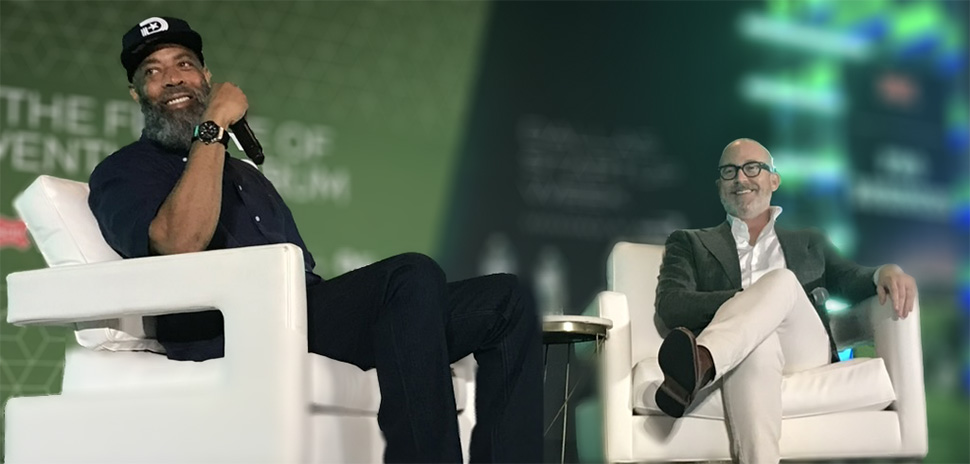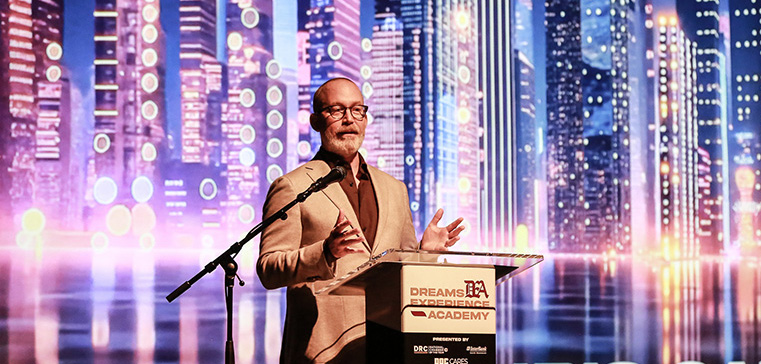“Tracy has a rare gift, not just as an artist, but as a visionary. He sees what’s missing, what’s needed, and what Dallas-Fort Worth must do now.”
Chris Gannett
President, Dreams Experience Academy
CEO, Gannett Partners
.…on hip-hop legend Tracy “The D.O.C.” Curry’s vision for the Dreams Experience Academy at its Kessler Theater launch.
![]()
A $3 trillion media, entertainment, and tech industry is searching for fresh talent and new perspectives. Meanwhile, in Southern Dallas, students with untapped potential are missing school at alarming rates. The folks behind the Dreams Experience Academy (DEA) see a connection—and a chance to do something about it.
That economic reality—and the opportunity within it—helped spark last week’s launch of the DEA, a nonprofit creating new pathways into high-growth creative industries for Dallas youth. The program is built to address two urgent needs at once: chronic student absenteeism in Southern Dallas ZIP codes—where rates reach as high as 47% compared to 26% nationwide—and the need for more diverse, homegrown talent in industries that thrive on innovation.
“This isn’t charity. This is investment,” said Latosha Herron Bruff of the Dallas Regional Chamber, one of the initiative’s backers. Speaking at the Kessler Theater, she added, “We are building the next generations of leaders, entrepreneurs, visionaries, change agents, storytellers, creators, producers.”
The DEA is pioneering a new model of learning—one that blends arts, STEM, and industry-driven education to re-engage students and build real career pathways.
For co-founder Tracy “The D.O.C.” Curry—the Grammy-nominated artist who lost his natural voice in a 1989 car accident and struggled to reconcile that loss—it’s personal.
“Chris [Gannett] likes to say I lost my voice in order to find my purpose,” The D.O.C. told the audience. “We are all made in His image, and we all have a purpose. The reason you are in here tonight, you were born for this purpose.”

Tracy “The D.O.C.” Curry and Chris Gannett speaking together at Dallas Startup Week in 2024. [Photo: Dallas Innovates]
The D.O.C. has said the accident forced a shift—not just in his voice, but in how he saw his place in hip-hop and the world. “I was in the hospital, thinking about what was next. It wasn’t just about my voice; it was about my place in hip-hop,” Curry said in a podcast interview last year. “I had to find a way to stay in the game.” Now he has channeled that challenge into a new mission: mentoring and empowering the next generation.
“We are Dallas in here. We are Marines in here,” he said to the crowd. “There are teachers and preachers in here. There are civic leaders and civil rights icons in here. There are mothers and fathers in here. There are children of the city of Dallas in here.
“And if we share anything, it is a love for our city. We know how special we are—and we know what we can be.”
That purpose came alive on stage. Performer Nyla Lael, an alumna of Big Thought, wore an outfit she designed and made herself. She brought the crowd into her world with a powerful spoken word performance:
“I can take you there. It’s not too far from here… Paradise… We can make it more than a dream. They told me I should find my tribe, get in with the base and the vibe. The style of the life, design of the nights I want for this life of mine. But what’s the trouble without me and you? I paint the picture, you make the view. Put it in perspective. Everyone needs it, too.”
As the performer explained in her introduction, if it’s “hands-on and hands-in, I will do it—and I love to do it.”
Lael said, “My why is because—I’m proud to say—that every single time that I have hit the stage, it has never, not once, been about me. It was always about the youth and the conversations that I’m hearing around me and those to come.”
That mix of self-expression and awareness is what the DEA is designed to unlock.
DEA President Chris Gannett, one of the driving forces behind the project, put it simply: the DEA is “proving that cultural capital can be a catalyst for financial capital.”
The DEA model backs that up, he says. It’s education—but more: a student-led business enterprise. Revenue will come from curriculum licensing, events, and monetizing venues.
As Brendan Donnelly of Taylor Sheridan’s Bosque Ranch Productions, another supporter, said on stage, “We’re really heavily invested in expanding the entertainment pie in Texas and, more specifically, in DFW.”
Erykah Badu, a sixth-generation Dallas native and neo-soul icon, sent her support via video. She talked about the role Dallas Parks and Rec programs played in her early years—teaching authenticity, integrity, and discipline.”Those are the three things that we need,” she said. “I was able to travel all over the planet just by being a part of that group. It helped develop my understanding for authenticity. It helped develop my understanding of integrity. It helped develop my understanding of discipline.”
The DEA’s summer pilot, launching soon with For Oak Cliff, will start in the gaming vertical—an intentional move, given how fast gaming is growing and how accessible it is for students with limited resources.
“This is about changing the system to meet the students,” Gannett said. That means real skills, real mentors, and real-world opportunities.
“Everything starts with the dream, and it’s all about us as adults being game changers to take care of our youth. We are the big people who will take care of these young ones and shape our future—and theirs too,” he said.
For more on DEA’s $6 million, five-year fundraising goal and the coalition of founding partners, read our full coverage of the Dreams Experience Academy launch.
For more of who said what about all things North Texas, check out Every Last Word.
Don’t miss what’s next. Subscribe to Dallas Innovates.
Track Dallas-Fort Worth’s business and innovation landscape with our curated news in your inbox Tuesday-Thursday.


























